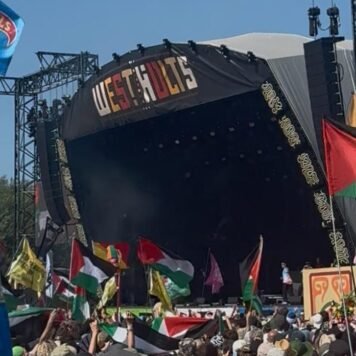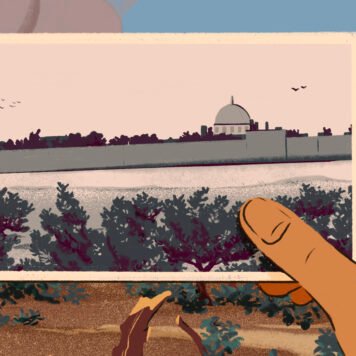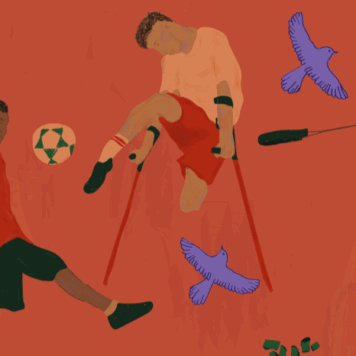On the 15th November, over 15,000 people from all walks of life gathered outside the Houses of Parliament – parents with their children, the elderly alongside the youth, and workers with students. Meanwhile, inside, Members of Parliament were voting on a ceasefire in Gaza.
Amidst the passionate fervour, a singular chant reverberated with the most power “Stop arming Israel, ceasefire now.” When we received the news that the vote did not pass, rage flooded the streets.
The weekend before, on 11th November, up to 1 million people took to the streets of London demanding a ceasefire. And it has been reported that over 76% of the British public support a ceasefire in Gaza.
So why, when there are millions, if not billions, worldwide chanting for ‘ceasefire now’, does it feel that our screams are met with silence?
The will of the people
In the past month, it has become clear that Western governments will continue to act in the interest of preserving their own authority and pursuits in the region over the will of their own citizens.
We’re out on the streets; we’re signing petitions; we’re sending letters to MPs; we’re taking direct action – the call from the people is resounding. So why are our governments sitting so stubbornly in their inaction?
The answer is simple. Their refusal to vote or call for a ceasefire is reflective of their priority: to protect an ethno-fascist settler colony that furthers their own imperialist interests, rather than to represent the will of their constituents – and it is coming at the unforgivable cost of genocide.
When a United Nations resolution was presented in support of a ceasefire on 16th October, we saw that the United States, Britain, and France all rejected the resolution. The US then further vetoed the amended version presented on 18th October.
When asked if there was any chance of a ceasefire, President Biden proudly responded that there is “no possibility.” Western leaders have thus proved to us, again and again, that they will continue to green light Israel to commit the most brutal of atrocities and war crimes, in flagrant violations of international law.
Here in the UK, both the Labour and Conservative parties have held equally shameful positions on Palestine. Despite the support for Palestine and for a ceasefire amongst British Trade Unions, the Labour Party, under Keir Starmer’s leadership, has refused to make ceasefire an official party position, ultimately leading to tens of Labour councillors leaving the party nationwide.
On November 15th, 56 Labour MPs (including front benchers) defied the Labour Party’s position and voted in support of a ceasefire, indicating a growing fracture within the party on the question of Palestine. Perhaps less surprisingly, the Conservative government, whose party position is steadfastly pro-Israel, sacked one of their MPs for calling for a ceasefire.
We are forced to ask: where does this insistence on commitment to Israel truly come from?
The answer lies in the United Kingdom’s entrenched roots in the upkeep of their imperial and colonial legacy.
Israel and the legacy of the British Empire
The Zionist state of Israel was strategically created by Britain as an imperial outpost in the region over a century ago. With the weakening Ottoman Empire, Palestine’s location at the crossroads of Europe and Asia became crucial for British trade and military control, particularly in securing the trade route to India.
British intervention focused on Palestine to safeguard British interests in the region. Various British institutions were formed to promote Zionist control in Palestine, including “The Association for Promoting Jewish Settlements in Palestine,” and the agricultural school “Mikveh Israel” near Yaffa in 1861. In parallel, Zionist institutions were founded in Britain, including the Jewish Chronicle, which demonstrated domestic efforts to promote Zionism within Jewish communities.
Following the fall of the Ottoman Empire, the Sykes-Picot Treaty of 1916 divided the region amongst the British and French, and British presence in Palestine (1917-1947) specifically aimed at supporting Jewish immigration and favouring Jewish land acquisition in Palestine, suppressing any Palestinian resistance to British and Zionist intrusion.
So, to those familiar with the history of British interests in the region, the Balfour Declaration comes as no surprise – a declaration made by the British government in 1917, promising support for “a national home for the Jewish people in Palestine.”
Placed within a historical context, it becomes clear how Israel always functioned as a regional anchor for Western interests – articulated most obviously, perhaps, by Joe Biden who, in 1986, infamously said that Israel “is the best 3 billion dollar investment we made. Whether or not there was an Israel, the US would have to invent an Israel.” His words, which recent events show that he would still stand by, highlight the intrinsic role Israel plays in furthering the US’s capitalist domination.
Today, the Zionist state of Israel continues to be an expansionist settler-colonial project that must be resisted by all good people of conscience around the world.
Policing and the prison industrial complex
Imperialism manifests in a number of ways in Palestine. One example is through policing and the prison industrial complex. Across historic Palestine, police are one of the primary instruments through which Israel exerts control and domination over Palestinian people – they regularly shoot, beat, torture, and brutalise Palestinians, with videos of these acts sprawled across social media for the world to see.
Subscribe to shado's weekly newsletter
Exclusive event news, job and creative opportunities, first access to tickets and – just in case you missed them – our picks of the week, from inside shado and out.

Before 7th October, over 5000 Palestinians were held captive in Israeli prisons and hundreds of these are under administrative detention which is illegal under international law and means that Palestinians are not allowed to stand trial, do not know under what charges they are being held, and are subject to indefinite renewal of their detention. Since 7th October, over 4000 additional Palestinians have been imprisoned highlighting the use of imprisonment as a colonial tactic to suppress Palestinian resistance.
In fact, prisons were used by the British in Palestine before the establishment of the Zionist state of Israel. Most famously, the British police executed three resistance fighters in Akka prison in 1930 during the British mandate over Palestine and the story of these three prisoners is immortalised in a song that Palestinians continue to sing generation after generation.
The story of these three prisoners is only one example of the regular incarceration of Palestinians under the British mandate. Moreover, the Palestine Police Mobile Force that was set up by the British became the model of heavily militarised counterinsurgency policing that they later transported to the Gold Coast, Northern Rhodesia, Eritrea, Malaya and Cyprus.
Today, prisons and policing continue to be a tactic used by the imperial West to stifle popular rebellion. Indigenous and other racialised communities continue to be incarcerated at alarming rates in the US, Canada, the UK, Australia, and elsewhere.
Additionally, during the Black Lives Matter protests in the United States, riot police fired rubber-coated bullets, tear gas canisters, and stun grenades; the same ones used against Palestinians by the Israeli police. Palestinians even shared tips on social media on how to deal with these assaults.
These examples highlight the political and material similarities in the violence enacted by these countries, and explains part of the reason why these nations have refused to call for a ceasefire: because they benefit from the prison industrial complex and policing relationships that further racist violence enacted by both Israel and the West.
The arms trade and the military industrial complex
Another example of how imperialism manifests today is through the arms trade and the military industrial complex.
Today, there are weapons factories across the country that manufacture the weapons that are being used to perpetrate war crimes against the Palestinian people in Gaza. Since 2008, the UK has licensed the export of arms worth £560 million to Israel.
One example is Elbit Systems, which has eight factories across Britain. Elbit is Israel’s largest arms provider, providing the Israeli military with 85% of its ‘killer drones’ that are being used to perpetrate the genocide in Gaza, These drones havealso been used to target civilians in Colombia, Kashmir and the Philippines, revealing just how far the tentacles of imperialism reach.
Similarly, BAE systems is a British-based company that manufactures components for F35 and F16 fighter jets that are currently being used by the Israeli military to conduct airstrikes on the people of Gaza. A ceasefire in Gaza would threaten the arms trade partnerships that exist between Israel and western nations, explaining yet another reason why these nations are refusing to call for a ceasefire.
However, the people will not be stifled. On Friday 10th November, over 400 trade unionists blockaded a BAE systems factory in Rochester, organised by Workers for a Free Palestine, refusing the utilisation of British labour in Israel’s atrocities and demanding a ceasefire.
Complicity of public institutions
But it’s not only through policing and militarisation that Western powers benefit.
Perhaps a less obvious – yet maybe more insidious – example of Western complicity is the role that UK universities play in enabling the Zionist project. Around the country, universities and other higher education institutions have investments in companies that are directly complicit in Israel’s ongoing colonisation of Palestine.
A group called ‘Demilitarise Education’ that conducts research into UK University partnerships and investments into the military sector and arms industry have uncovered £1.7 billion in funds. And students aren’t standing for it either. On Thursday 9th November, there were student walk-outs across multiple university campuses across the UK, with one of the key demands being to call on universities to divest from complicit companies.
Unsurprisingly, banks are also cashing in on the ongoing terror in Palestine. Barclays holds over £1 billion in shares and provides over £3 billion in loans to companies whose weapons, components, and military technology are used in Israeli violence against Palestinians.
By providing investment and financial services to these arms companies, Barclays facilitates the provision of weapons and technology for Israel’s militarised repression of Palestinians. It is therefore not only direct relationships with policing and militarisation from which Western powers benefit: there’s also an indirect link through these UK public institutions that invest in – and are subsequently making a profit from – Israel’s ongoing settler colonial project in Palestine.
Palestine as central to anti-imperialist struggle
The Palestinian cause therefore is not only a cause against Zionism, but a cause against imperialism itself.
We can only understand why the West is refusing to call for a ceasefire through a historical and contemporary analysis of imperialism. What this highlights is that, when we speak out against the current genocide, we are not only resisting Israel, but also the instruments that strengthen the relationship between Israel and western powers, including policing and the prison industrial complex, the arms trade, and investments of UK universities and other public institutions.
What this also highlights is that the crackdown on pro-Palestinian voices and Palestinian activism is only one symptom of broader attempts to stifle any anti-imperialist resistance.
You only need to look to the Police, Crime, Sentencing and Courts Act (2022) to see how the UK Government is attempting to stifle all forms of protest and mass mobilisation – and that this is not limited to the arena of Palestine, though a draconian response to pro-Palestine action is currently high up on the agenda evidenced by threats to ban pro-Palestine protest and certain protest chants and slogans like ‘From the River to the Sea’.
But it bears repeating, for the sake of the ongoing pursuit of justice, that the people are not bowing to this pressure. All of the organising actions currently taking place around the world are targeted and coordinated. From protest, to boycott, to direct action, they all have a cumulative effect on forcing Western powers into a ceasefire by applying pressure through multiple tactics and targets.
These levers must continue to be pulled, and actions must continue to escalate. The Palestinian Youth Movement have joined the International People’s Assembly and the Answer Coalition to call on the international community to Shut It Down for Palestine.
We called for global days of action on Thursday 9th November and Friday 17th November and, on both days, saw incredible actions around the world: from blockading arms factories and shutting down bridges to local businesses closing their shops and students walking out of class.
We will continue to call for days of action until our demand for an unconditional ceasefire is met.
What can you do?
- To keep updated on PYMs work and actions, you call follow us on Instagram (@palestinianyouthmovement) and Twitter (palyouthmvmt)
- You can find out more about upcoming global days of action here: Shut It Down for Palestine
- The Palestinian Youth Movement has also endorsed and developed toolkits to support different sectors in the Global Days of Action, including:










